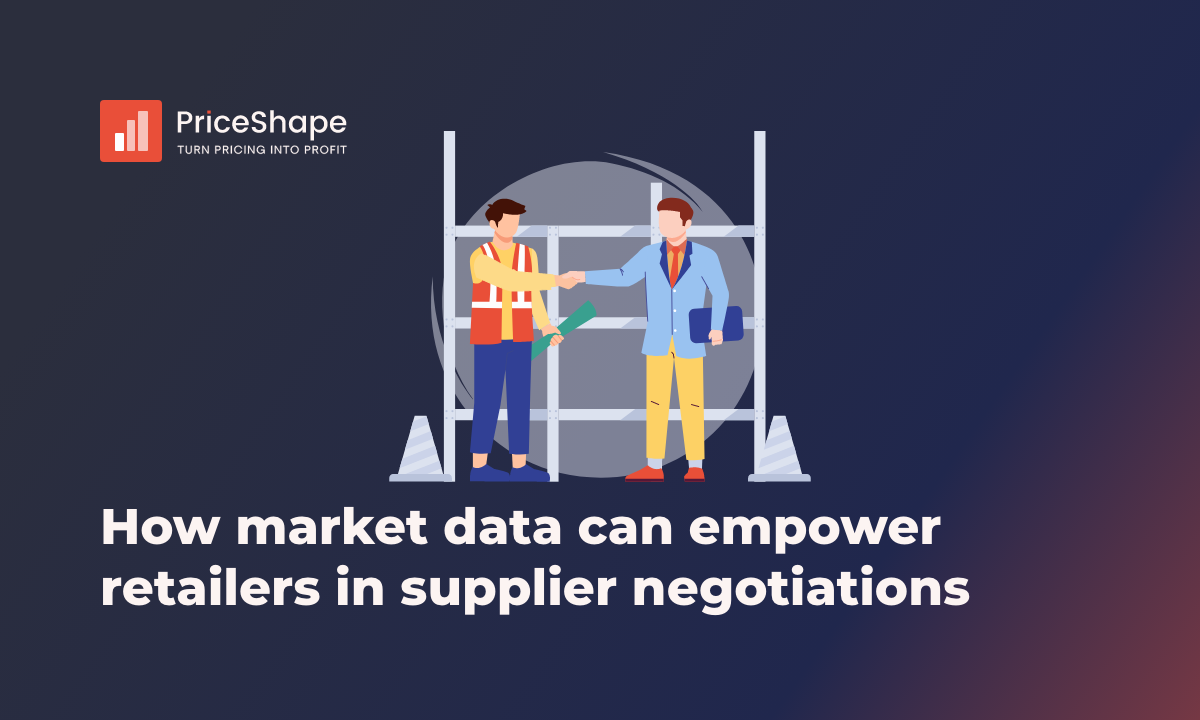How market data can empower retailers in supplier negotiations
Supplier negotiations play a crucial role in the retail sector. Learn how to use market data to optimize the outcome of your supplier negotiations.

Supplier negotiations play a crucial role in the retail sector. In an ever-changing retail landscape, where consumer transparency is increasing through various services, successful negotiations with suppliers are vital for you as a retailer to achieve sustainability and profitability.
To excel in supplier negotiations, retailers need strong bargaining power, which can be acquired in various ways. However, one invaluable tool that significantly enhances negotiation outcomes is access to market data.
In this blog post, we will explore three key aspects related to market data and how each aspect benefits you as a retailer during supplier negotiations.
Key aspect 1: Cost and profit analysis based on market data
Pricing is critical in any negotiation; market data can provide comprehensive insights into how your competitors position themselves. Knowing the pricing strategies of key competitors and the overall market allows you, as a retailer, to analyze the profitability of your product assortment from new perspectives.
But how can market data affect your profitability? Imagine having information about your competitors' pricing to evaluate the profitability of your products if you price them competitively in the market. This knowledge lets you, as a retailer, evaluate your entire product assortment, identify areas with advantageous purchasing deals, and determine where competitors may have more favorable terms. Equipped with data-backed pricing requests, you can confidently negotiate, aiming for better margins, volume discounts, and favorable pricing terms.
Key aspect 2: Strategic assortment focus
Understanding how competitors price their products is crucial when preparing for supplier negotiations. This data can help strategically focus your effort during negotiations by combining this knowledge with the before-mentioned cost and profit analysis and internal sales data.
By analyzing competitor pricing, you can identify if competitors offer better deals on your top-selling products. These insights enable you to assess your position in the market and understand which products are most vulnerable to price competition. Supplier negotiations involve a delicate balance of give-and-take, and by being aware of which products are most impacted by competitor pricing, you can prioritize where to be flexible and where to stand your ground. You can prioritize securing favorable terms for high-selling products facing strong competition while being more flexible on items with lower price sensitivity.

Key aspect 3: Transparent retailer-supplier relationship
Strong supplier relationships are essential for you to secure favorable terms. Lack of transparency and communication can hinder collaboration, causing you to miss out on opportunities for pricing improvements mentioned in the first key aspect.
Transparency in supplier relationships fosters an environment of collaboration and trust. Therefore, market data becomes invaluable for building strong relationships with your suppliers. It allows you to openly discuss insights generated from the competitor analysis, such as identifying those starting price wars or continuously pricing too low.
By bringing the results of your market analysis to the table, you can engage in discussions about market trends and strategies to maintain competitive pricing. This opens avenues for jointly identifying opportunities, exploring cost-saving measures, and improving product offerings. Leveraging the expertise and insights of suppliers ultimately delivers enhanced value to retailers' customers and drives business growth.
In summary, market data is a powerful ally for retailers in supplier negotiations, providing them with a strategic advantage. Without access to market data, retailers can be blind to obvious areas of improvement and, thereby, cannot negotiate as effectively with their suppliers as possible. By utilizing market data to conduct in-depth assortment analysis, retailers can focus their energy on strategically selected products during negotiations.
Knowledge of competitor pricing helps retailers negotiate more favorable terms on key products and strengthens their overall competitive position. Transparency about market dynamics and the current market situation builds trust with suppliers. Moreover, transparency demonstrates a solid understanding of market conditions and the impact of pricing on retailers' businesses. Combining transparency with strategic flexibility ensures a positive outcome in negotiations.
If you want to learn how PriceShape can help you generate invaluable market insights retailers & eCommerce, visit our retailers & eCommerce page for more information.
.png?width=814&height=448&name=Pricing%20%E2%80%93%2048%20(1).png)


